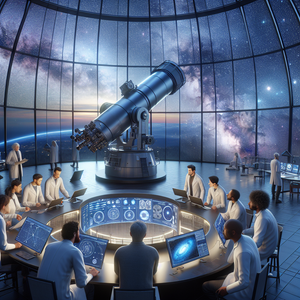
Exploring Career Paths in Astrophysics: Roles, Salaries, and Insights
Astrophysics is an enthralling field that reveals the mysteries of the universe, scrutinizing celestial phenomena and their underlying physical principles. As science and technology continue to evolve, the demand for astrophysics professionals is on the rise, creating a wealth of career opportunities for those equipped with relevant degrees. This article delves into ten exciting career paths within astrophysics, highlighting the responsibilities associated with each role, necessary qualifications, average salaries, and future prospects.
Job Summaries:
University Professor:
- University professors in astrophysics hold a pivotal position in academia, nurturing the next generation of scientists while conducting innovative research.
- Typically armed with a PhD in astrophysics or a related discipline, these educators create course materials, deliver lectures, and mentor students.
- Their research often delves into complex subjects like black holes and cosmic evolution.
- Salaries can range from $70,000 to $120,000 annually, depending on experience and institution type.
- The outlook for faculty positions is generally stable, with opportunities for advancement through research grants and scholarly publications.
Astrophysics Technologist:
- Astrophysics technologists are essential to the field.
- Tasked with developing and maintaining sophisticated instruments used in astronomical research.
- They design, build, and test essential equipment such as telescopes and sensors.
- A bachelor's or master's degree in engineering, physics, or a related field is typically required.
- Hands-on experience with instrumentation is necessary.
- The average salary stands around $80,000.
- Robust job growth is expected due to ongoing technological advancements.
Research Physicist:
- Research physicists in astrophysics explore celestial phenomena through experiments and simulations that test theoretical models.
- Holding a PhD in physics or astrophysics, these scientists often work in labs or observatories.
- Collaborating with interdisciplinary teams to publish their findings and secure funding.
- Salaries typically range from $90,000 to $120,000 annually.
- As new projects and technologies emerge, demand for skilled researchers is anticipated to grow.
Data Scientist:
- Data scientists with a background in astrophysics are crucial for analyzing vast datasets generated by telescopes and simulations.
- They utilize statistical and computational methods to derive insights from complex data.
- Proficiency in programming languages like Python or R is necessary.
- A degree in astrophysics, computer science, or mathematics is essential.
- The average salary for data scientists in this field is about $100,000.
- Strong job growth is expected across academia, government, and private research sectors.
Aerospace Engineer:
- Aerospace engineers specializing in astrophysics design and develop spacecraft and satellites critical for astronomical research.
- They focus on key systems such as propulsion and aerodynamics, requiring a degree in aerospace engineering or a related field.
- Strong problem-solving skills and a solid physics foundation are essential for success.
- The average salary for aerospace engineers ranges from $95,000 to $130,000, with job opportunities expected to expand as space missions increase.
Planetarium Educator:
- Planetarium educators craft and present engaging educational programs about astronomy and astrophysics, aiming to inspire public interest in science.
- Responsibilities include developing presentations and managing outreach efforts in collaboration with schools and community organizations.
- A background in astronomy or education is beneficial.
- Salaries typically range from $50,000 to $70,000.
Astronomer:
- Astronomers conduct comprehensive studies of celestial objects and phenomena, primarily within academic and research institutions.
- Generally requiring a PhD in astronomy or astrophysics.
- Their work involves observing celestial events, modeling astronomical phenomena, and publishing findings.
- The average salary for astronomers is around $95,000.
- Opportunities for collaboration on international research projects.
Science Communicator:
- Science communicators in astrophysics play a key role in making complex scientific concepts accessible to a broader audience.
- They create content for various media formats, from articles to documentaries.
- A background in science, communication, or journalism is advantageous.
- Salaries can vary, typically ranging from $50,000 to $90,000.
Astrophysics Consultant:
- Astrophysics consultants offer specialized knowledge to organizations seeking insights into astronomical phenomena.
- They may collaborate with aerospace companies, government agencies, or educational institutions.
- Generally require a PhD or substantial experience in the field.
- Salaries for consultants can vary widely, ranging from $80,000 to $150,000.
Planetary Scientist:
- Planetary scientists focus on studying planets, moons, and other celestial bodies.
- Utilizing data from space missions and telescopes.
- A PhD in planetary science or a related field is typically required.
- Responsibilities include analyzing geological samples and modeling planetary atmospheres.
- The average salary for planetary scientists is around $90,000.
In summary, a degree in astrophysics unlocks numerous career opportunities that contribute significantly to scientific knowledge while offering competitive salaries and room for professional growth. Exploring these diverse roles helps aspiring astrophysicists identify their career aspirations and navigate the dynamic job market.
Explore More Jobs

